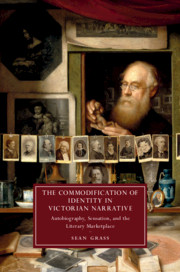 The Commodification of Identity in Victorian Narrative
The Commodification of Identity in Victorian Narrative Book contents
- The Commodification of Identity in Victorian Narrative
- Cambridge Studies in Nineteenth-century Literature and Culture
- The Commodification of Identity in Victorian Narrative
- Copyright page
- Dedication
- Contents
- Figures
- Acknowledgments
- Introduction Life Upon the Exchange: Commodifying the Victorian Subject
- Chapter 1 “A Vile Symptom”: Autobiography and the Commodification of Identity
- Chapter 2 “Portable Property”: Commodity and Identity in Great Expectations
- Chapter 3 Lady Audley’s Portrait: Textuality, Gender, and Power
- Chapter 4 Amnesia, Madness, and Financial Fraud: Ontologies of Loss in Silas Marner and Hard Cash
- Chapter 5 “What Money Can Make of Life”: Willing Subjects and Commodity Culture in Our Mutual Friend
- Chapter 6 The Moonstone, Sacred Identity, and the Material Self
- Conclusion Money Made of Life: The Tichborne Claimant
- Appendix
- Notes
- Works Cited
- Index
- Cambridge Studies in Nineteenth-Century Literature and Culture
Chapter 5 - “What Money Can Make of Life”: Willing Subjects and Commodity Culture in Our Mutual Friend
Published online by Cambridge University Press: 24 October 2019
- The Commodification of Identity in Victorian Narrative
- Cambridge Studies in Nineteenth-century Literature and Culture
- The Commodification of Identity in Victorian Narrative
- Copyright page
- Dedication
- Contents
- Figures
- Acknowledgments
- Introduction Life Upon the Exchange: Commodifying the Victorian Subject
- Chapter 1 “A Vile Symptom”: Autobiography and the Commodification of Identity
- Chapter 2 “Portable Property”: Commodity and Identity in Great Expectations
- Chapter 3 Lady Audley’s Portrait: Textuality, Gender, and Power
- Chapter 4 Amnesia, Madness, and Financial Fraud: Ontologies of Loss in Silas Marner and Hard Cash
- Chapter 5 “What Money Can Make of Life”: Willing Subjects and Commodity Culture in Our Mutual Friend
- Chapter 6 The Moonstone, Sacred Identity, and the Material Self
- Conclusion Money Made of Life: The Tichborne Claimant
- Appendix
- Notes
- Works Cited
- Index
- Cambridge Studies in Nineteenth-Century Literature and Culture
Summary
In September 1863, as he began work on what would be his last finished novel, Dickens’s negotiations with Chapman and Hall for Our Mutual Friend hit an unexpected snag. They had agreed quickly on a price, a whopping £6,000 for half copyright, but in writing to accept the terms the publishers made a surprise request: would Dickens be willing to provide contractually for the return of some money if he died before finishing the work? It is hard to know for certain what they saw in Dickens that made them ask. He remained hale and energetic – creased and careworn after his domestic troubles, but crackling with energy, running All the Year Round with his usual vigor and basking in the relatively recent success of Great Expectations.
- Type
- Chapter
- Information
- The Commodification of Identity in Victorian NarrativeAutobiography, Sensation, and the Literary Marketplace, pp. 161 - 188Publisher: Cambridge University PressPrint publication year: 2019
